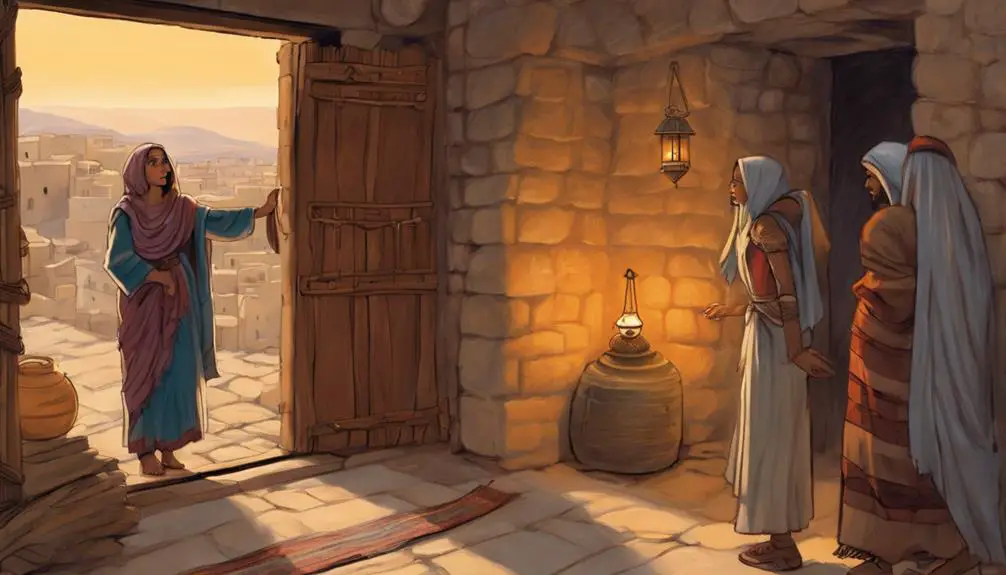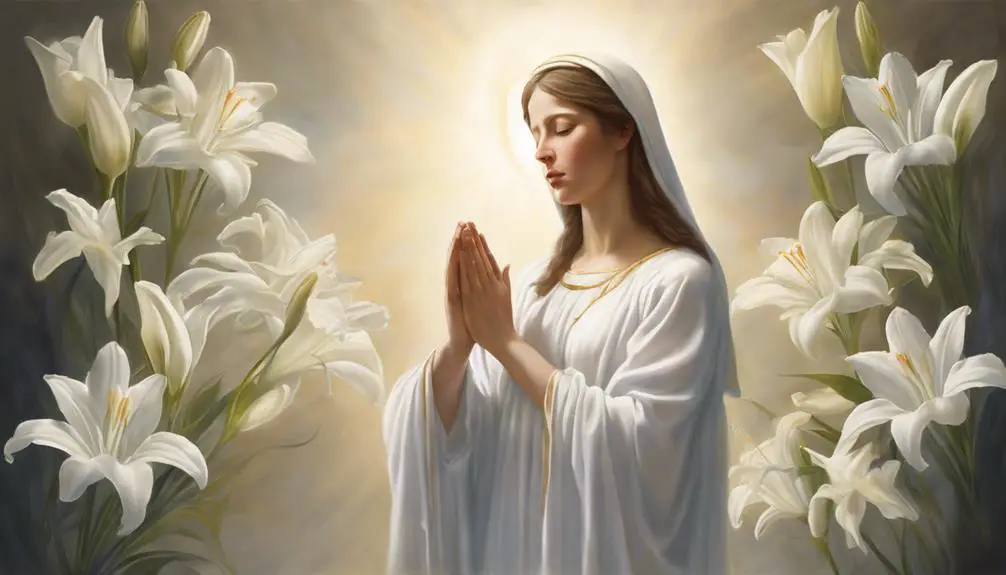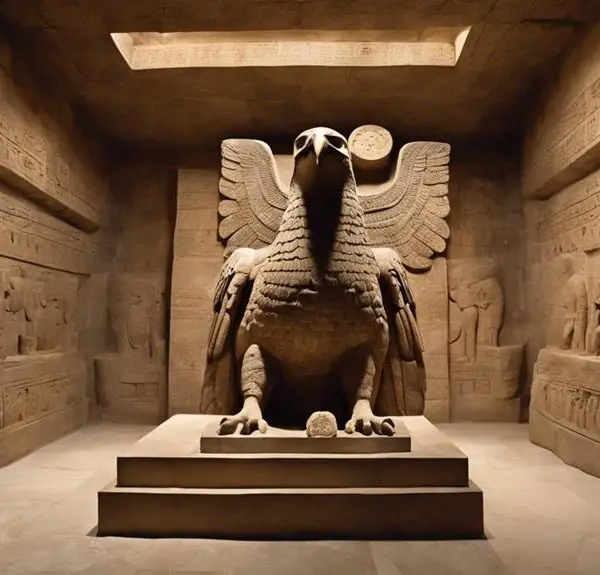Biblical matriarchs like Sarah and Mary guide generations with faith and wisdom, uncover their timeless stories to inspire your spiritual journey.

Spiritual Mothers in the Bible
In the tapestry of biblical narratives, certain women have left more than just a footprint on the sands of time; they've woven threads of spiritual motherhood that continue to inspire.
You might find yourself drawn to Sarah's unwavering faith, Deborah's leadership, Rahab's hospitality, Ruth's loyalty, or Mary's obedience. Each of these women played pivotal roles, not just in the context of their immediate families, but in the broader spiritual heritage of generations to come.
As you explore their stories, you'll uncover layers of wisdom and strength that resonate even in today's world, inviting you to reflect on their enduring legacy.
Key Takeaways
- Spiritual mothers illustrate profound faith, from Sarah's journey to Mary's divine obedience.
- They embody leadership and wisdom, as seen in Deborah's courageous decisions and fair judgments.
- Their stories highlight loyalty and devotion, with Ruth's commitment to Naomi bridging cultural divides.
- Acts of hospitality and courage, like Rahab's, underscore their pivotal roles in biblical narratives.
Sarah's Legacy of Faith

Sarah's legacy of faith, exemplified by her journey from skepticism to steadfast belief, serves as a profound example of spiritual transformation in the Bible. Initially, Sarah's barrenness is a source of deep anguish, reflecting a common biblical motif where infertility is juxtaposed with divine promise. However, her story unfolds to reveal a nuanced understanding of Covenant Motherhood, transforming barrenness from a curse into a blessing. This transformation is pivotal, underscoring the notion that faith's fruition often emerges from the barren landscapes of doubt and despair.
Analyzing Sarah's narrative, it's evident that her eventual belief in God's promise becomes a foundational element of her legacy. She transitions from doubting her ability to bear a child to embodying the role of a covenant mother. This shift isn't merely personal but emblematic of a larger theological narrative; her faith journey catalyzes the fulfillment of God's promise, making her a crucial figure in the Abrahamic religions.
Moreover, Sarah's story invites a scholarly reevaluation of barrenness, not as an endpoint but as a conduit for divine blessing. Her transformation from skepticism to faith underscores a broader biblical theme: the redemptive potential of faith in the face of impossibility. This aspect of Sarah's legacy offers a rich, analytical perspective on the intersections between faith, promise, and the reimagining of motherhood within the biblical covenant.
Deborah: Prophetess and Leader
Shifting focus from Sarah's paradigm of faith and motherhood, we now explore Deborah's unique role as both a prophetess and a leader within the biblical narrative. Unlike many of her contemporaries, Deborah exemplifies a multifaceted leadership style that blends her warrior spirit with profound judicial wisdom. Her story, found in the Book of Judges, illuminates the potential of women to serve as both spiritual and political leaders in ancient Israel.
- *Warrior Spirit*: Deborah's call to Barak to lead Israel against the Canaanites showcases her courage and strategic acumen. Her presence at the battlefront, alongside Barak, underscores her willingness to participate actively in her nation's defense, embodying a warrior spirit that's rare among biblical figures.
- *Judicial Wisdom*: As a judge, Deborah's role wasn't limited to military leadership. She also presided over legal disputes with wisdom and fairness, earning her a reputation for being a just and discerning leader.
- *Prophetic Insight*: Deborah's prophetic abilities enabled her to foresee the outcome of Israel's battles and provide guidance that was rooted in a deep connection to the divine will.
In synthesizing these qualities, Deborah's story challenges traditional gender roles and highlights the importance of both courage and wisdom in leadership.
The Hospitality of Rahab

Rahab's act of hospitality, extending protection to Israelite spies, marks a pivotal moment in biblical narratives, revealing the unconventional ways faith and allegiance can manifest. Her story, deeply embedded within the conquest of Jericho, showcases Rahab's courage, not just as a matter of personal bravery but as a profound expression of faith in the God of Israel. This act of protecting the spies under her roof, at great personal risk, underscores her extraordinary commitment and the pivotal role hospitality plays in the unfolding of divine plans.
Analyzing Rahab's actions, it's evident that her hospitality went beyond mere sheltering. By hiding the spies from her own people and negotiating her family's safety, Rahab actively participated in the Israelite narrative. Her courage reshaped the destiny of her household and emphasized the power of faith-driven action.
The scarlet symbol, a cord Rahab was instructed to hang from her window, serves as a tangible sign of her agreement with the spies and God's protection over her household. This symbol, rich in its layers of meaning, not only represented her physical salvation but also her spiritual inclusion into the community of faith, bridging cultural and ethical divides through an act of profound hospitality and courage.
Ruth: Loyalty and Devotion
Just as Rahab's story illuminates the power of faith-driven hospitality, the narrative of Ruth underscores the profound significance of loyalty and devotion within the scriptural tradition. Ruth, a Moabite, embarks on an extraordinary journey of loyalty by choosing to stay with Naomi, her mother-in-law, after the death of her husband. This decision marks the beginning of a remarkable intercultural friendship that defies the boundaries of nation and kinship.
- *Inter cultural friendship*: Ruth's commitment to Naomi transcends cultural and national barriers, showcasing a profound bond that highlights the universality of loyalty and devotion.
- *Harvest significance*: The backdrop of the harvest season in Ruth's story is symbolic of renewal and divine providence, illustrating how loyalty and hard work underpin the provision of sustenance and the continuation of lineage.
- *Loyalty as a spiritual principle*: Ruth's unwavering loyalty to Naomi isn't just a personal choice but a spiritual act that aligns with the virtues celebrated in the scriptural tradition, emphasizing the sacredness of commitment and care.
Ruth's narrative invites you to ponder the depths of loyalty and devotion, urging a reevaluation of relationships beyond the superficial ties of common culture or immediate benefit. Her story is a testament to the enduring power of faithful companionship and its capacity to bridge divides and foster communal harmony.
Mary: Model of Obedience

In analyzing the biblical narrative, Mary emerges as a quintessential model of obedience, her life encapsulating the virtue through her pivotal response to divine calling. Her angel encounter stands as a monumental moment, not just in her story, but in the fabric of Christian doctrine.
When the Angel Gabriel visits her, announcing the Immaculate Conception, Mary's world is upended. Yet, it's her reaction that cements her as a spiritual paragon. She doesn't balk at the news or question her worthiness. Instead, she accepts this divine mission with humility and grace, uttering, 'Behold, I'm the servant of the Lord; let it be to me according to your word.'
This act of acceptance isn't passive but a dynamic affirmation of faith and trust in God's plan. The implications of her obedience are vast, bridging the divine with the mortal, and setting in motion the salvation narrative. Mary's unwavering commitment in the face of uncertainty and potential societal scorn exemplifies her role as a spiritual mother, guiding not through words, but through the power of example.
Her life, marked by this encounter and her subsequent actions, becomes a study in the strength of obedience and faith, making her an eternally revered figure in Christian spirituality.
Frequently Asked Questions
How Do the Roles of Spiritual Mothers in the Bible Influence Modern-Day Mentorship and Spiritual Guidance in Religious Communities?
You're examining how mentorship methodologies and community impacts influenced by historical figures shape modern-day guidance in religious circles. These figures, without directly mentioning, set a precedent for nurturing and leadership roles within communities.
Their influence permeates through time, enhancing mentorship and spiritual guidance. By analyzing their methods, you're uncovering the roots of contemporary practices, revealing how ancient teachings continue to mold the fabric of mentorship and community dynamics today.
In What Ways Did Cultural and Societal Norms of Their Times Shape the Actions and Legacies of These Biblical Spiritual Mothers?
Cultural norms and societal hierarchies deeply influenced their actions and legacies. Gender dynamics, pivotal in their times, dictated their roles and how they could influence others.
You'll find their navigation through these constraints both illuminates and shapes their contributions. Their adept maneuvering within predetermined societal roles showcases a nuanced understanding of their environments, profoundly impacting their ability to mentor, guide, and leave a lasting legacy.
Are There Any Examples of Spiritual Mothers in the Bible Who Faced Significant Criticism or Opposition, and How Did They Overcome It?
You're exploring figures who faced criticism or opposition. Delving into their stories, you find that motherhood symbolism intertwines with criticism resilience.
For example, Deborah, a prophetess, overcame societal skepticism by leading Israel to victory, embodying both spiritual motherhood and resilience. Her tale, among others, showcases how these figures didn't just navigate opposition; they transformed it into a testament to their strength, redefining societal norms in the process.
How Do Non-Traditional Interpretations of the Bible View the Roles and Contributions of These Spiritual Mothers?
You'll find that non-traditional interpretations of the Bible, particularly through the lens of feminist theology, offer a refreshing perspective on gender roles.
These interpretations emphasize the significant contributions and roles of women, often overlooked in conventional readings.
Can the Concept of Spiritual Motherhood Be Found in Other Religious Texts Outside of the Bible, and How Do These Examples Compare With the Biblical Ones?
You're venturing into a realm where interfaith parallels and comparative mythology weave a tapestry of understanding.
In various religious texts, the concept of spiritual motherhood mirrors its Biblical counterparts, yet each tradition adds unique hues to the narrative.
Analyzing these texts, you'll uncover a rich mosaic of guidance, nurture, and wisdom.
Through scholarly comparison, the similarities and contrasts with Biblical figures emerge, offering a detailed exploration of spiritual motherhood's universal resonance.
Conclusion
In weaving through the tapestry of biblical narratives, you've encountered the threads of spiritual motherhood that bind together faith, leadership, and devotion. Sarah, Deborah, Rahab, Ruth, and Mary emerge not as mere characters, but as pillars of spiritual fortitude.
Their stories, rich with wisdom and courage, serve as beacons, guiding us through the fog of modern challenges. In their reflection, we find not just historical figures, but timeless mentors whose legacies illuminate the path of righteousness and resilience.



Sign up